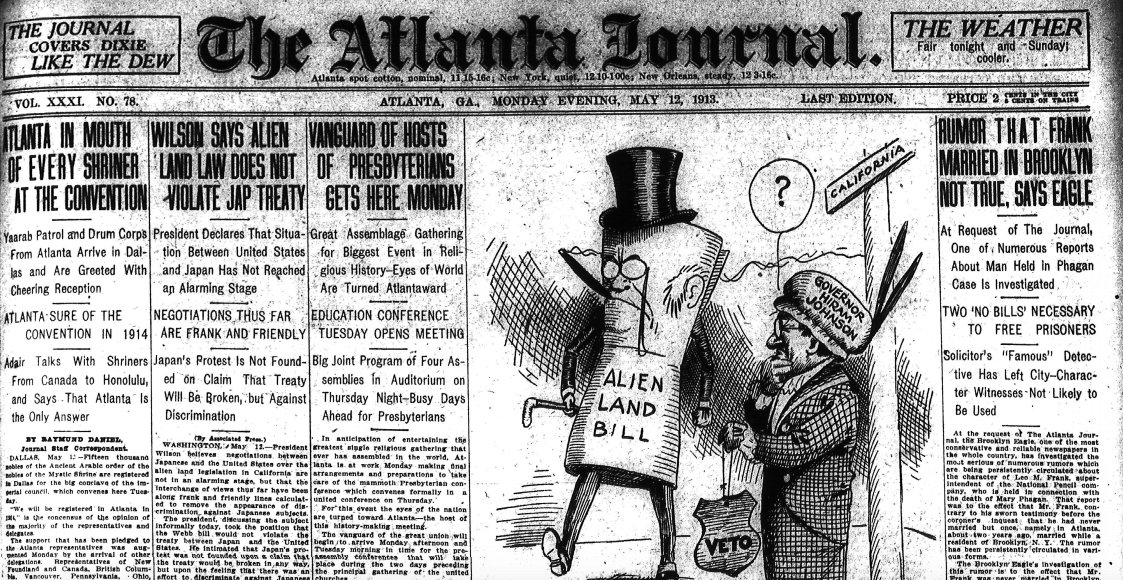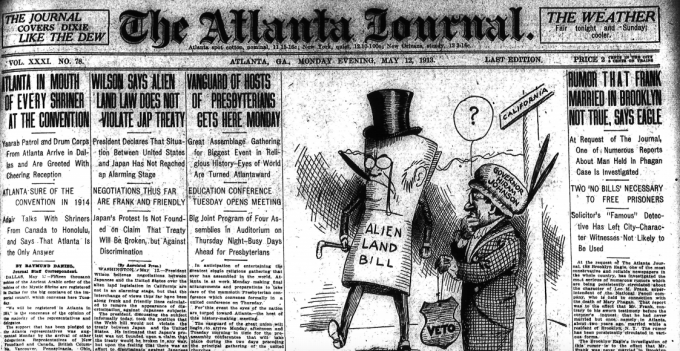Another in our series of new transcriptions of contemporary articles on the Leo Frank case.
Atlanta Journal
Monday, May 12th, 1913
At Request of The Journal, One of Numerous Reports About Man Held in Phagan Case Is Investigated
TWO ‘NO BILLS’ NECESSARY TO FREE PRISONERS
Solicitor’s “Famous” Detective Has Left City-Character Witnesses Not Likely to Be Used
At the request of The Atlanta Journal, the Brooklyn Eagle, one of the most conservative and reliable newspapers in the whole country, has investigated the most serious of numerous rumors which are being persistently circulated about the character of Leo M. Frank, superintendent of the National Pencil company, who is held in connection with the death of Mary Phagan. That report was to the effect that Mr. Frank, contrary to his sworn testimony before the coroner’s inquest that he had never married but once, namely in Atlanta, about two years ago, married while a resident of Brooklyn, N. Y. The rumor has been persistently circulated in various forms.
The Brooklyn Eagle’s investigation of this rumor is to the effect that Mr. Frank was never married in Brooklyn. His mother, now residing in Brooklyn, says the Eagle declares Mr. Frank married in Atlanta and Atlanta only, and there is no record in Brooklyn to the contrary. This report from a reliable newspaper is given to the public in accordance with The Journal’s policy to print all of the facts and nothing but the facts in connection with this case.
Attorneys declared Monday that even if witnesses who could attack Mr. Frank’s character could be found that they would not be allowed to testify in court should Mr. Frank ever face a jury. The state is never allowed to put the character of a defendant in issue and no past misconduct, however grievous or even if it is a matter of court record, is admitted in evidence unless the defense first makes a point of the character of the man on trial. This is seldom done in criminal cases.
GRAND JURY MEETS FRIDAY.
Solicitor Hugh M. Dorsey would make no statement Monday as to the probable time that the Phagan investigation will reach the grand jury. The grand jury will hold another routine meeting on Friday and its members have been directed to hold themselves in readiness for a call meeting at any time. Solicitor Dorsey will not even state whether the case will be taken to the jury by him before or after the regular Friday meeting.
Mr. Dorsey Monday set at rest the rumor that a bill, charging Newt Lee with the murder, would not be presented to the grand jury for its consideration when that body takes up the investigation of the Phagan case.
In all cases, he says, where people are committed to the grand jury by a coroner’s jury or magistrate’s court, a bill charging them with the offense of which they are suspected is put before the jury, even if at the time the solicitor general expects a “no bill” to be returned.
TWO “NO BILLS” NECESSARY.
Interesting in connection with the grand jury’s connection with the Phagan case is the fact that should the body return a “no bill” against either Mr. Frank or the negro Lee or against both of them, they would not be released from custody.
To automatically secure the release of a person held on a coroner’s warrant or a magistrate’s warrant, two separate grand juries must return no bills. The case is then “dead.”
The present grand jury will be in session until July 1, and the two men could be held until after that date and after another jury has “no billed” their cases before they would be released.
A grand jury is composed of not more than twenty-three nor less than eighteen members. Practically always the maximum number is selected by the court, for with twenty-three men sworn, a grand jury can then allow five of its members to remain away from sessions if they so desire, and still perform its functions.
TWELVE MUST VOTE TO INDICT.
Twelve of the eighteen grand juror, who must be present, must vote in favor of an indictment before a “true bill” can be returned. The indictment requires twelve votes, whether eighteen or twenty-three jurors are present when it is considered.
While it is not customary, if the grand jurors themselves so desire, they can have a defendant before it if he wishes to make a statement, or they can hear the testimony of any witnesses for the defense, or listen to the arguments of any attorney for the defense. As a rule, however, the grand jury simply considers the state’s case and leaves it to the superior court jury to decide when the evidence to be introduced by the defense is stronger than that of the state.
DETECTIVE LEAVES TOWN.
That the mysterious detective to whom Solicitor General Dorsey was quoted as referring last week in the investigation of the murder of Mary Phagan, is an out-of-town man was indicted by the solicitor himself Monday morning.
“He left town last Friday,” said the solicitor, “and while he was here he did very valuable work. It is possible that he may be called back into the case.”
Further than that, he would say nothing about the case. He declined to state whether the evidence unearthed by the unknown detective strengthened the case against the two men who have been held for the grand jury, or whether it led in some new direction.
WHO WROTE NOTES?
Mr. Dorsey would not state whether or not the man’s work is complete. It is probable that the “famous detective,” although Mr. Dorsey does not discuss the point, will not return unless some one is brought to trial for the Phagan murder.
The detectives worked on all phases of the case and not particularly in an effort to strengthen the case either of the men held by the coroner’s jury, according to the solicitor.
It is said that at the detective’s suggestion the solicitor has secured handwriting experts, who offer the opinion that the letters found by the girl’s body were not written by Lee. This conflicts with the opinions of several local handwriting experts.
Mr. Dorsey confirmed The Journal’s published statement that the public knows now all of the important facts in the case. “Nothing new or sensational has been developed,” said he.
VISITED BY WIFE.
Mrs. Leo M. Frank went to the tower on Sunday afternoon, paying her first visit to her husband since his arrest nearly two weeks ago. Mrs. Frank came to the jail with her father, Emile [sic] Selig, of 68 East Georgia avenue, about 5 o’clock, and they were admitted to the assembly room on the first floor. Mr. Frank was brought down from his cell on the second floor, and he chatted with his wife and his father-in-law for nearly an hour.
Soon after his arrest Mrs. Frank called at police headquarters, but Mr. Frank at that time was being examined by the detectives, and she left without seeing him.
Mr. Frank had a number of visitors during the day, among them being Luther Z. Rosser, his chief counsel, and a number of friends who attended Cornell university with him.
HAS LEE TOLD ALL?
The status of Newt Lee, the negro night watchman, in the Phagan investigation is not yet definite, it appears. There exists some uncertainty as to just how directly he will be held for the crime.
“I have not been able to satisfy myself that the negro is not connected with it in some way,” said Chief of Detectives Newport Lanford Monday. “I don’t know just what his connection is, but he knows more than he has told.”
Mr. Frank is receiving the same treatment accorded practically all white prisoners at the tower, and in the matter of diet is not forced to eat the meals prepared at the jail. As a result his meals are prepared at his home on East Georgia avenue and sent to him by special messenger three times a day.
Sunday was far from a day of rest for the detectives and officials who are seeking the solution of the Phagan murder mystery. During the day Solicitor General Hugh M. Dorsey held conferences with Chief of Police Beavers and several other officials, and the detectives, who have been detailed to the case, went to many parts of the city, running down rumors.
No new clews and no evidence of marked importance have been unearthed, and the detectives are devoting their activity largely to elimination of seemingly conflicting evidence and to the securing of witnesses to corroborate details of the statements of the principal state’s witnesses.
The detectives are using every effort to get the case in shape for presentation to the Fulton county grand jury, which will probably take up the Phagan investigation during the next ten days.
“FIND THE MURDERER.”
Interesting in the case is the status of the Pinkerton detectives, who were employed soon after the tragedy by the National Pencil company to solve the mystery. Recently Pinkerton officials went to officers of the National Pencil company, it is said, and asked if the pencil company desired them to continue the investigation. It was then, according to a report, that Luther Z. Rosser, counsel for the company and for Leo M. Frank, who is held by order of the coroner’s jury, told the Pinkertons to continue the probe.
“Find the murderer,” Mr. Rosser is quoted as saying.
“Let the chips fall where they may. You are employed to hunt the murderer until he is found and convicted, it matters not who is guilty.”
The Pinkertons are co-operating with the local city detective department, and Superintendent Harry Scott, who has been on the case from the first, now has five men in the field, who are pursuing a vigorous investigation of the mystery.
WITNESSES EXAMINED.
On Monday Solicitor General Dorsey again devoted practically his entire time to the Phagan investigation. He was closeted most of the day with Detectives Campbel [sic] and Starnes and together they interviewed a number of witnesses. Among them were several employes of the factory, notably Herbert J. Schiff, assistant to Superintendent Frank, M. B. Darley and E. T. Holloway, the day watchman at the factory.
* * *
Atlanta Journal, May 12th 1913, “Rumor That Frank Married in Brooklyn Not True, Says Eagle,” Leo Frank case newspaper article series (Original PDF)

